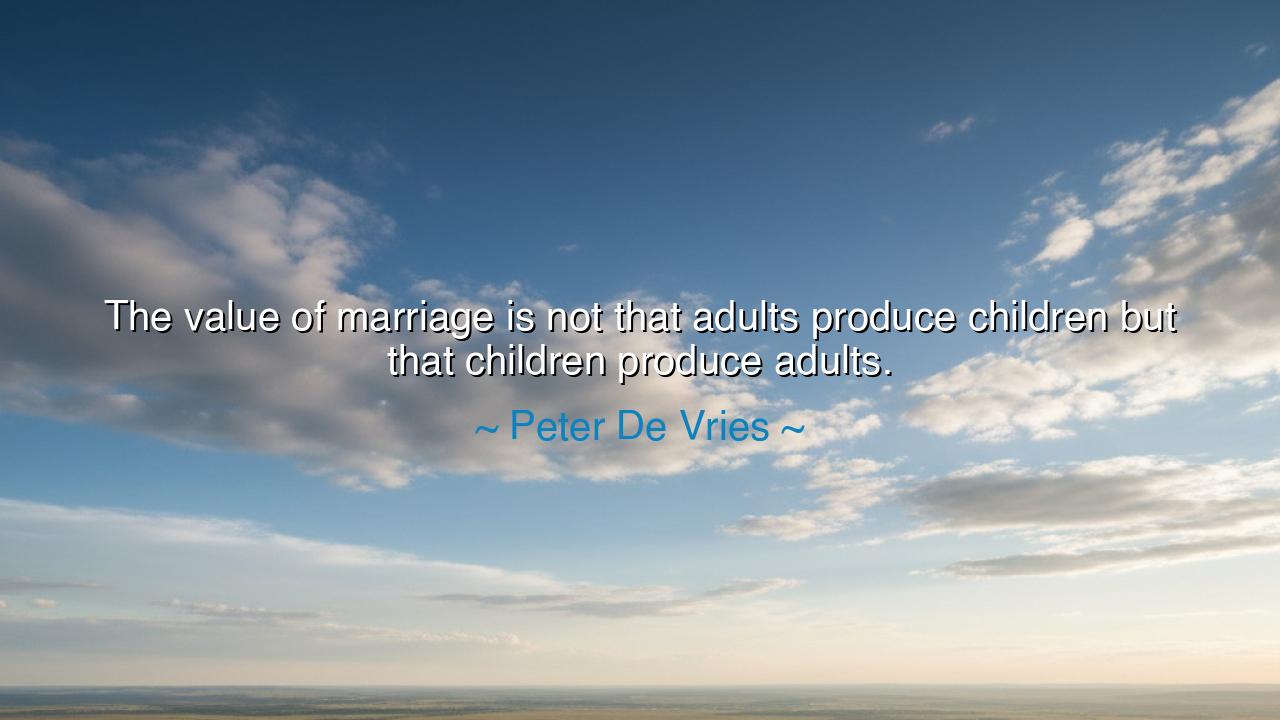
The value of marriage is not that adults produce children but
The value of marriage is not that adults produce children but that children produce adults.






In the words of Peter De Vries, the wry observer of the human heart, we find a truth both humorous and profound: “The value of marriage is not that adults produce children but that children produce adults.” Though it may seem a jest, this saying conceals the quiet wisdom of a philosopher. For De Vries, whose pen was as sharp as his understanding of the soul, saw that parenthood is not merely the creation of life—it is the transformation of the spirit. Through the arrival of children, men and women are called from the immaturity of self to the discipline of love. The miracle of family, he teaches, is not only that it gives birth to the next generation, but that it recreates the parents themselves.
To understand the meaning of these words, one must look past their wit and into their moral depth. When De Vries says that children “produce adults,” he does not mean the mere passage of years, but the shaping of character. There are many who grow old without growing wise, many who live long yet remain centered only upon themselves. But when a child enters the world, a great alchemy begins. The selfish learn to give; the impatient learn to wait; the careless learn to guard something precious beyond their own life. The helplessness of a newborn reveals to the parent his own duty, his own vulnerability, and his own need to become better than he was. Thus, in raising children, we are raised ourselves.
The origin of this insight lies not only in De Vries’s personal experience, but in the eternal rhythm of humanity. Since the dawn of time, parenthood has been the school of compassion and endurance. The ancients knew this well. In every tribe and civilization, the raising of children was not seen as a private task, but as a sacred apprenticeship in responsibility. It was said that a warrior could be fearless in battle yet tremble before the cradle, for in that small face he saw both his own frailty and his own eternity. Parenthood reveals that life is not one’s own possession—it is a trust handed down, a living flame to be guarded for the world to come.
Consider the story of Mahatma Gandhi and his son Harilal. Though Gandhi was the great teacher of nonviolence, his journey as a father was marked by struggle and remorse. His child’s rebellion wounded him deeply, but through it, he came to see that love is not mastery, but mercy. In striving to raise his son, Gandhi himself was raised—taught patience, humility, and the acceptance of imperfection. His son’s defiance became the crucible in which the father’s compassion was forged. This is the hidden truth of De Vries’s saying: it is not the ease of family life that forms the adult, but its trials—the nights of worry, the sacrifices of comfort, the constant call to give more than one thought possible.
Indeed, children are the silent teachers of the human heart. They expose the limits of our wisdom, the weakness of our tempers, and the shallowness of our selfish desires. But they also awaken in us the greatest of all virtues—selflessness. To guide them, we must first guide ourselves; to teach them, we must learn anew. The journey of raising a child is, in truth, the journey of being reborn into maturity. The parent who kneels beside a crying child learns more about humility and tenderness than any philosopher in his study. Through their innocence, children call forth the best within us; through their dependence, they remind us of our duty to care, to endure, and to love without condition.
Yet De Vries’s insight also carries a gentle warning: marriage and parenthood are not ends in themselves, but means to growth. The mere act of producing children does not ennoble a person; it is what one becomes through that act that holds value. Parenthood must not be a pursuit of pride or tradition, but a conscious path toward wisdom. Every tantrum, every small joy, every act of forgiveness within the home becomes a lesson in the art of humanity. The family, when guided by love, becomes not only a refuge from the world, but a forge where character is tempered and souls are refined.
The lesson, then, is both humbling and ennobling. If you are a parent, see in your child not a burden, but a mirror. Let their laughter remind you of wonder, their questions awaken your curiosity, their needs summon your generosity. If you are yet to be a parent, remember that adulthood is not defined by age, but by the courage to care for others more than oneself. And if you are a child, know that your presence in this world is a gift that transforms those around you.
Thus, let the words of Peter De Vries stand as a testament to the sacred reciprocity of life: parents give children existence, but children give parents meaning. Through the innocent hands of the young, the old are reshaped, softened, and made wise. For in the great circle of love and learning, it is not only the child who grows—it is the human spirit itself, ascending toward its fullest and most compassionate form.






AAdministratorAdministrator
Welcome, honored guests. Please leave a comment, we will respond soon